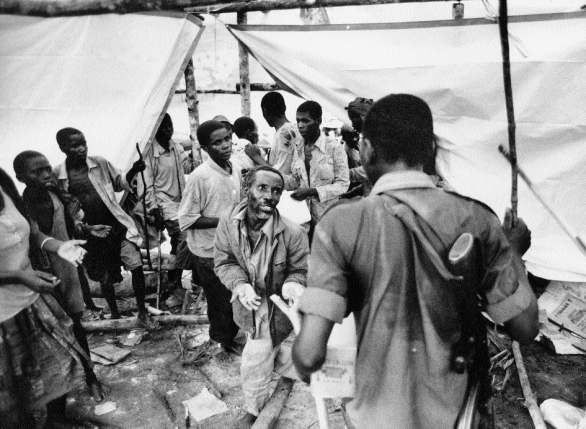Humanitarian Assistance withheld and used as bait
On a number of occasions, attacking forces made it impossible to get humanitarian aid to starving, exhausted and sick refugees, either by blocking access to them or by relocating them out of the reach of assistance, thus depriving them of resources essential to their survival (OHCHR, 2010). According to Human Rights Watch, when ADFL forces first took control of eastern Zaire, they excluded humanitarian agencies for several weeks, making it impossible for them to deliver needed aid to the refugees who were fleeing the camps (Human Rights Watch, n.d.).

Humanitarian aid agencies have been used repeatedly by the military to either locate refugees or lure them out of the forest in order to eliminate them (Médecins Sans Frontières, 1997).
“When Rwanda had invaded Zaire, I discovered, the RPF used humanitarian organizations, the United Nations and journalists as a means to locate and kill refugees” wrote Judi Rever. “As the war progressed, there was mounting evidence that Rwanda had gained access to satellite equipment that enabled it to intercept the texts, voice and video communication of NGOs, media and other personnel in the field. As soon as aid workers found refugees and got them to stay in one place so they could bring them food and medical care, Rwanda-backed rebels and RPF forces would move in, cordon off the area and attack, or chase the refugees into more remote, denser areas of the jungle in what they called “bait and kill” operations.” (Rever, 2018)
The Investigative Team of the Secretary-General described the blockage of humanitarian assistance as systematic in nature and as a crime against humanity. “The available information strongly suggests that at least the massacres committed by the AFDL and its allies during the period October 1996 to May 1997 and the denial of humanitarian assistance to displaced Rwandan Hutus were systematic practices involving murder and extermination, which constitute crimes against humanity, as defined by the Statutes of the International Criminal Tribunals for the Former Yugoslavia and for Rwanda. (Investigative Team of the Secretary-General, 1998) Par. 95
“In the first three months of 1997, many refugees died of exhaustion and hunger during their journey between Kigulube and Shabunda. In danger of being killed at any moment, those in these groups, who were unfamiliar with their surroundings and undernourished, received no humanitarian aid. Having blocked aid agencies from operating outside a 30-kilometre radius of Bukavu, AFDL/APR officials established the condition that AFDL facilitators must accompany all their missions. According to several witnesses, these facilitators took advantage of their presence alongside the aid workers to supply AFDL/APR soldiers with information about the whereabouts and the movements of refugees. In this way, the soldiers were able to kill the refugees before they could be recovered and repatriated. During the same period, AFDL/APR soldiers officially barred Zairian civilians living in the region from giving assistance to refugees. Under this restriction, soldiers killed an unknown number of Zairians who had directly assisted refugees or collaborated with international NGOs and UN organisations to locate them and bring them assistance. The total number of refugees who died of hunger, exhaustion or disease in this part of South Kivu is impossible to establish but is probably in the region of several hundred, or even several thousand.“
(OHCHR, 2010. Report of the Mapping Exercise Documenting the Most Serious Violations of Human Rights and International Humanitarian Law Committed Within the Territory of the Democratic Republic of the Congo Between March 1993 and June 2003, Geneva: Office of the United Nations High Commissioner for Human Rights, page 91 para 209 (web version))
